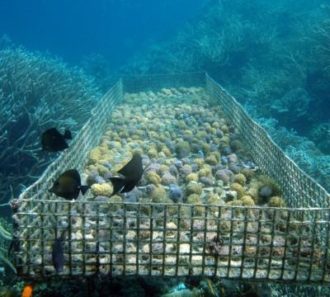The Challenge
The Federated States of Micronesia (FSM) and the Republic of the Marshall Islands (RMI) are fledgling sovereign nations. Both nations have low per capita GDP and high unemployment. Like many developing small island nations, the FSM and RMI are economically marginalized. The people of FSM and RMI have skills and resources for aquaculture, agriculture, and agro-forestry but the nations’ economic development lags far behind the potential. According to Simon Ellis, director of the Marine and Environmental Research Institute of Pohnpei (MERIP), one of the most successful aquaculture enterprises in the FSM and RMI to date has been farming of marine ornamental invertebrates for supplying home aquariums in the United States and Europe. Giant clams, hard and soft corals, ornamental sponges, zooanthids, and corallimorphs are all cultured using simple techniques for live export via air freight. Ellis states, “Importantly, these methods of farming are considered highly sustainable with extremely low environmental impact and are endorsed and promoted by conservation groups and local governments as a means of income generation and poverty alleviation for rural communities. In addition, marine ornamental farming is identified as a key economic development activity for the FSM and RMI.” Ellis designed his Western SARE Professional Development Program project, “Training in Marine Ornamental Farming for Extension Professionals in Micronesia (project number EW11-001),” with the assumption that the marine ornamental aquaculture industry in Micronesia could be improved by better skills, knowledge, and communication between practitioners.
Searching for a Solution
This project’s objectives were:
- Improved communication and coordination between practitioners and extension professionals in the FSM and RMI.
- Increased skill levels of extension professionals and practitioners in marine ornamental culture methods.
- New and improved partnerships within and between existing producers and extension professionals.
- Increased number of individuals entering into marine ornamental farming either at the community or commercial level.
The project aimed for 25-30 individuals with outreach responsibilities to receive training. Land grant and faculty professionals who work in aquaculture education and outreach from the College of Micronesia – FSM (COM-FSM) and College of the Marshall Islands (CMI) were the primary audience. In addition, MERIP staff and private sector practitioners from Kosrae and Majuro were part of the learning group, as well as members from the local fisheries management agencies in Pohnpei, Kosrae, and Majuro and key personnel from grass roots conservation groups that promote sustainable aquaculture in the region.
Outcomes
In total 53 people involved in the marine ornamental industry received training or outreach from this project. According to Ellis, in 2012, three activities occurred:
- A training workshop in Pohnpei;
- A study tour of Majuro and Kosrae; and
- A study tour to the Marine Aquarium Conference of North America annual meeting.
Project follow-ups were conducted in 2013 and early 2015 and technical assistance was provided throughout the project period.
Key participants reported sustained increased productivity, activity and coordination between producers and extension workers; increased skill levels; and new partnerships. Results of an exit survey from the Pohnpei workshop indicate that all participants strongly felt they had a better understanding of the marine ornamental industry. Further, all felt the workshop would help them with their work and 86% said they would use methods used in their training in the next six months.
Ellis described the project as a “massive success.” Testimonials include:
- Micronesian Marketing and Management Enterprises (MMME) owner and manager Martin Selch in Kosrae reported greatly improved communication with Kosrae Fisheries staff following the workshops in 2012.
- Kosrae Fisheries staff member Bruno Ned, who also attended the workshops in 2012, reported “an increased appreciation of the needs of the private sector” and a stronger partnership with MMME.
- Provan Crump, manager of the largest giant clam and marine ornamental farm in the RMI, also felt that interactions and exchange of ideas were the most important aspect of the workshops and trainings. He keeps in touch with the two other wholesalers in Palau and Kosrae on a regular basis. He also stated that there was a better understanding between him and his public sector partners.
Ellis says, “While number of producers in the Micronesia region is quite small, the workshops and site visits helped greatly to garner collaboration.” Examples of changes include:
- MMME formed a new business relationship with Watson Mariculture in Palau. Mr. Selch visited Palau twice following the Pohnpei workshop in 2012 and has subsequently begun importing products from Palau to add to his own product line in Kosrae.
- All exporters/wholesalers, including MERIP, reported record sales in 2013.
- Private sector exporters were reluctant to give details of export figures. However, MERIP, as a quasi-private entity was willing to share this information. Coral exports in 2012 for MERIP were 14,735 and in 2013 this grew to 21,392, an increase of 45%.
- Through improved communication between MERIP and Marshall Island Mariculture Farm (MIMF) in 2013, MIMF’s parent company, Ocean Reefs and Aquariums in Fort Pierce, Florida entered into an agreement with Petco to purchase corals sold by MERIP. This has significantly improved exports for both companies. This increase continued into 2014 and early 2015.
Where to Learn More
MERIP website
